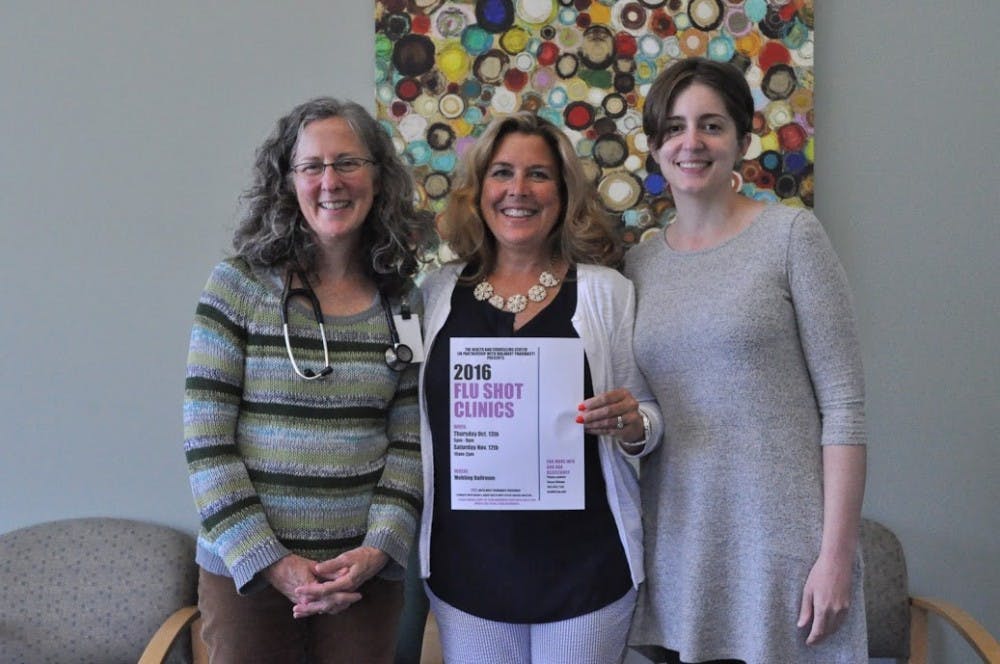It’s that time of the year again where students are constantly coughing during lectures, sniffling while taking an exam, sneezing in line for coffee and missing their classes. Flu season generally starts in early October and lasts until around March.
This year, the Health and Counseling Center will be partnering with Walmart Pharmacy to bring flu vaccinations to campus, a different process than in past years. Walmart Pharmacy will be able to bill any health insurance so students will not have to pay out-of-pocket costs.
“Most insurance will cover it one hundred percent, so it is essential for students to bring their insurance card with them,” Susan Chisum, Assistant Director for Primary Care Services at the Health Center, said.
The first flu shot clinic will be on Thursday, Oct. 13 from 5 p.m. to 9 p.m. in the Mehling Ballroom.
Students with the university health insurance can go to the Health Center website, click the “Health” tab and go to “Costs and Insurance” to print a temporary ID card that will show proof of insurance.
Flu symptoms can vary from fever, headaches, fatigue, stuffy nose, sneezing, sore throats and chest discomfort or coughing.
Senior education major Chelsea Baclaan said she had been sick for over two weeks as of Sunday. After a weekend with the Chapel Choir retreat where she stood out in the rain, she started seeing symptoms of a viral infection - coughing, runny nose, high fever, chills and vomiting - though there have been no official reports of the flu in the U.S. yet this year.
Baclaan missed about a week of student teaching.
“I didn’t have a lot of energy, so I collapsed a lot,” Baclaan said.
Susan Chisum, Assistant Director for Primary Care Services at the Health Center, stressed the importance of taking the flu vaccination.
“The importance is for all of us that are healthy to get immunized, especially living on campus to where we are in close proximity,” Chisum said. “(It is important) to prevent any widespread flu outbreaks that would affect the campus in addition to protecting members of the community that may come on campus to visit.”
Below are some tips from the Health and Counseling Center on how to stay healthy this flu season:
1. Hand washing
Everything that you touch on campus has been touched by other people, whether the classroom door knob or the bathroom faucet. It is important to wash your hands or carry hand sanitizers, in case you’re in a situation where you can’t.
2. Avoid sharing food or drinks
Every food or drink shared with another person can lead to sharing whatever illness they may have. People are most contagious the first 24 hours after being infected, generally before they have symptoms.
3. Get adequate sleep
A sufficient amount of sleep, ideally 7-8 hours per night, is necessary for college students. Doing homework is important, but sleep is vital for staying healthy.
4. Exercise
Working out is a great stress reliever. It aids in better sleep and helps keep your immune system strong.
5. Drink water
Water is the number one medicine for any sickness. If you get the flu, it is also helpful to drink warm liquids because it helps loosen the mucous that your body uses to rid itself of the virus, and it can help alleviate a sore throat.
6. Limit physical contact
Limiting physical contact with friends and other people reduces chances of spreading illness. If you’re not feeling well, consider taking the day off to rest.
7. Visit the Health Center
It may become necessary to seek help from the Health Center or alternate medical care when you get symptoms such as high fever, neck stiffness, persistent coughing, trouble swallowing or inability to take in food.
8. Flu Vaccination
Immunity from the vaccination usually lasts for about 8-9 months, according to Chisum. Flu season lasts from October to around March, so it is recommended to take the flu vaccine in October.If you have your flu vaccine early in the season and there is a bad flu outbreak, it may be recommended for high risk individuals to have a second dose.
--
To schedule an appointment with the Health and Counseling Center, call (503) 943-7134. With any questions, contact them at health@up.edu. They are located on the first floor of Orrico Hall and are open Mondays through Fridays from 8:30 a.m. to 4:30 p.m.









